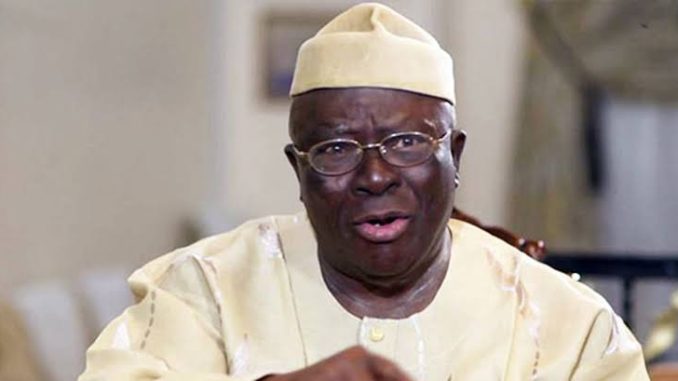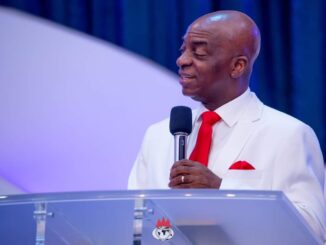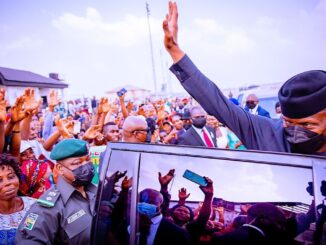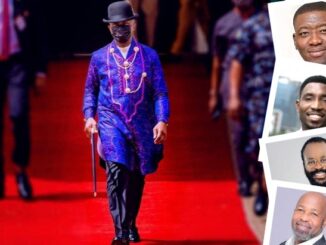
Afenifere leader, Pa Ayo Adebanjo, has made a startling revelation of how the Pan-Yoruba socio-cultural group urged the South-West governors to boycott the Federal Government’s transition programme in 1999 to spark off crisis in the polity, as an opposition to the set agenda to change of power to civil rule without constitutional reforms.
The 96-year-old statesman, Pa Adebanjo, made the revelation when he was featured on the popular TV Talk Show, Inside Sources anchored on Channels TV by a veteran journalist, Laolu Akande, on Friday, March 15, 2024.
In a riveting exclusive interview with Laolu Akande, a former presidential aide, Baba Adebanjo, a venerable leader of the Afenifere, unveiling a little-known chapter of Nigeria’s political history, said, “Afenifere refused to take part until the constitution was changed.
“We were not going to participate until the constitution was returned to the position we had at independence,” declared Baba Ayo Adebanjo, underscoring the group’s unwavering stance on constitutional reform.
Shedding light on the group’s efforts to champion federalism and democratic principles, as well as reflecting on the erosion of federalism during military rule, Adebanjo lamented, “Even after oil was found in Oloibiri, it was based on derivation, until the military came and changed all the provisions of the constitution. This formula of constitution is causing trouble in the country.”
Lamenting the military incursion into a democratic system of government inherited at independence, undermining the constitution, the interview took a dramatic turn as Adebanjo disclosed Afenifere’s audacious move to urge South-West governors to boycott engagements with the Federal Government in 1999.
ALSO READ: Mass abduction: Akande urges Tinubu to confront national insecurity challenges head-on
He said, “We asked South-West governors to create a crisis by boycotting the Federal Government in 1999. It was a strategic move aimed at compelling the Federal Government to heed our calls for constitutional dialogue and reform.”
Adebanjo said the repercussions of Afenifere’s directive were seismic, sending shockwaves through the political landscape and sparking a crisis of legitimacy for the fledgling civilian administration.
Underscoring the depth of Afenifere’s commitment to democratic ideals and the lengths to which they were willing to go to advance their cause, Adebanjo said, “We insisted that the constitution must be changed.”
“So when we came in, we got the mandate of all the people. We won all the elections in the whole western region of the nation,” Adebanjo emphasized, highlighting the electoral success that followed Afenifere’s principled stand.
His revelations provided invaluable insights into the strategic calculus of Nigeria’s political actors and underscored the importance of grassroots activism in shaping the country’s democratic trajectory, as he highlighted part of their successes to be, “Every state of our assembly, at that time, the moment they were inaugurated, they passed a resolution for a sovereign national conference in each House of Assembly.”
Still miffed with the state of the nation as Nigeria still grapples with complex political dynamics 25 years later, Adebanjo, thereby, appealed to President Bola Tinubu to uphold the tenets of federalism and democratic governance, emphasising his historical alignment with the principles of federalism and his pivotal role in championing democratic ideals as a former ally of Afenifere.
Reminiscing about Tinubu’s early political career, Adebanjo stated, “He was with us in the trenches. It was on the cause of federation in 1979 that he became the governor of Lagos State.”
With a firm stance on constitutional matters, Adebanjo recalled past endeavours where Afenifere, alongside Tinubu, resisted attempts to introduce constitutional frameworks deemed detrimental to federalism. “When they were going to introduce this constitution, we refused to take part until we decided to revert to the original one,” Adebanjo asserted, highlighting Tinubu’s alignment with Afenifere’s advocacy for constitutional reform.
Consequently, Adebanjo appealed to Tinubu with a sense of urgency, echoing the need to safeguard Nigeria’s democratic principles amidst ongoing political challenges. “I have been appealing to President Tinubu,” Adebanjo reiterated, emphasizing the critical role Tinubu could play in steering Nigeria towards a path of democratic consolidation and equitable governance.




